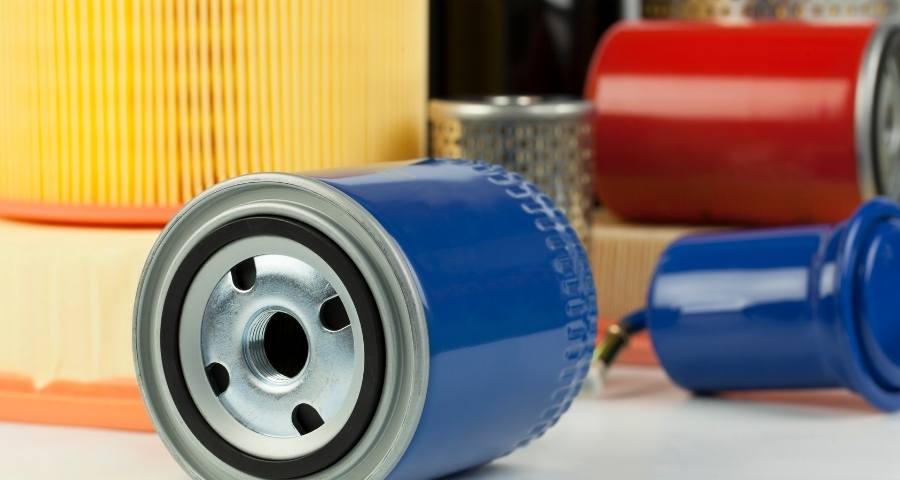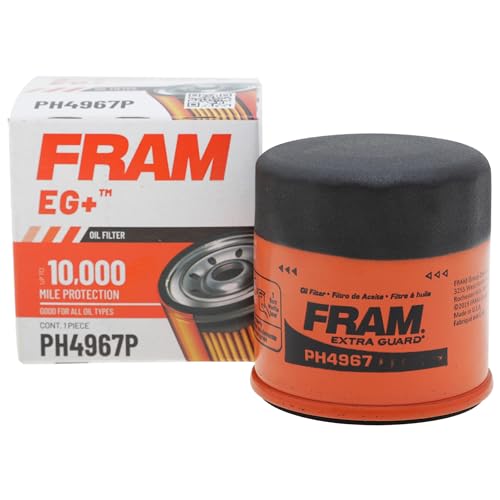
Wix vs Fram Oil Filters – Your Complete Vehicle Protection Guide
The performance of your engine is affected just as much by your oil filter as it is by the engine oil. In this Wix vs. Fram oil filter review, we compare what these two brands have to offer in terms of durability and filtering efficiency.
Choosing the right oil filter can make the difference between a car that runs for 100,000 miles and one that lasts 300,000 miles. With countless brands promising superior protection, two names consistently dominate the conversation: Wix and Fram. But which one actually delivers better engine protection for your money?
Understanding the real differences between these popular filter brands requires looking beyond marketing claims. We’ll examine construction quality, filtration performance, and real-world value to help you make the best choice for your vehicle.
Understanding Oil Filter Basics: Why Your Choice Matters
Your oil filter serves as your engine’s primary defense against contamination. Every minute your engine runs, microscopic particles of dirt, metal shavings, and combustion byproducts mix with your motor oil. Without effective filtration, these contaminants circulate through your engine, wearing down critical components and shortening your vehicle’s lifespan.
Modern oil filters use specialized media to trap particles while maintaining proper oil flow. The bypass valve opens when the filter becomes clogged or oil is too thick, ensuring lubrication continues even in extreme conditions. However, not all filters perform these functions equally well.
Poor filtration costs more than just replacement parts. Contaminated oil leads to increased wear on pistons, cylinders, and bearings. Over time, this results in reduced performance, higher fuel consumption, and eventual engine failure. Investing in quality filtration typically pays for itself through extended engine life and improved reliability.
Wix Oil Filters: Construction and Performance Analysis
07/11/2025 1:27 am
Wix Filter Construction Quality
Wix filters feature robust construction designed for extended service intervals. Most Wix filters use metal end caps instead of the cardboard found in economy filters. This provides better structural integrity and prevents collapse under pressure.
The filtration media consists of a fiberglass composite blend that offers consistent performance across temperature ranges. A spiral-wound metal center core provides additional reinforcement, preventing media collapse during high-flow conditions. The bypass valve typically opens at 27 PSI, ensuring adequate oil flow even when the filter reaches capacity.
Wix filters achieve a 21-micron nominal filtration rating in their standard models. Their XP (Extended Performance) line offers enhanced construction with improved media technology, though efficiency ratings vary by specific model.
Wix Filter Performance Characteristics
Standard Wix filters provide reliable protection for normal driving conditions. The metal construction and quality media ensure consistent performance throughout the service interval. Flow rates remain adequate for most applications, with bypass valve operation providing insurance against oil starvation.
Price positioning places Wix in the mid-range category, offering better construction than economy filters without premium pricing. Availability is excellent, with distribution through major auto parts chains and online retailers. The extensive application coverage means finding the correct filter for your vehicle is typically straightforward.
Service life expectations align with manufacturer recommendations, though many users report satisfactory performance beyond standard intervals under normal driving conditions.
Fram Oil Filters: Design Features and Capabilities
07/11/2025 1:27 am
Fram Filter Construction Overview
Standard Fram filters (the familiar orange can) use traditional cellulose paper media with cardboard end caps. This construction keeps costs low but may compromise durability under extreme conditions. The bypass valve design varies by model, with different pressure ratings across the product line.
However, Fram’s Ultra series represents a significant upgrade. These filters feature synthetic media with metal end caps and enhanced construction. Wire-backed media in some models provides additional strength and consistent filtration performance.
The construction differences between standard Fram and Fram Ultra are substantial enough that they should be considered separate product categories rather than variations of the same filter.
Fram Filter Performance Evaluation
Standard Fram filters operate with a 36-42 micron filtration rating, allowing larger particles to pass compared to many competitors. While adequate for basic protection, this level of filtration may not provide optimal engine protection, especially in demanding conditions.
The Fram Ultra series changes this equation dramatically. These filters achieve 99% efficiency at 20 microns according to ISO 4548-12 testing standards. This performance level rivals or exceeds many premium filter brands, representing excellent value in the synthetic filter category.
Flow characteristics vary significantly between Fram product lines. Standard models prioritize flow over filtration, while Ultra models balance both requirements more effectively. Service intervals remain consistent with manufacturer recommendations across both product lines.
Head-to-Head Comparison: Wix vs Fram
Filtration Efficiency Showdown
The efficiency comparison reveals interesting results that challenge common assumptions. Standard Wix filters with their 21-micron rating outperform standard Fram filters (36-42 microns) in particle capture. However, Fram Ultra filters achieve 99% efficiency at 20 microns, significantly outperforming Wix XP filters which achieve only 50% efficiency at the same particle size.
This comparison highlights the importance of comparing specific product lines rather than brands. A Fram Ultra filter provides superior filtration compared to any standard Wix filter, while a standard Wix filter outperforms a standard Fram filter.
Dirt-holding capacity varies by filter size and media area. Larger filters typically provide longer service life regardless of brand, though media quality affects overall capacity. Real-world testing shows both brands perform adequately under normal driving conditions.
Build Quality and Durability
Construction quality differences become apparent when examining filter components. Wix consistently uses metal end caps across their product line, while standard Fram filters use cardboard construction. This difference affects structural integrity, especially in high-pressure or high-temperature applications.
Media construction varies significantly between models. Wix uses fiberglass composite media that maintains consistent performance across temperature ranges. Standard Fram uses cellulose paper that may degrade more quickly under extreme conditions. Fram Ultra uses synthetic media that matches or exceeds Wix performance characteristics.
Long-term durability reports from mechanics and enthusiasts suggest both brands provide adequate service life when used within their design parameters. Premature failure rates appear similar when comparing filters of equivalent construction quality.
Value and Cost Analysis
Price comparison requires careful attention to specific product lines. Standard Fram filters typically cost less than standard Wix filters, reflecting the construction differences. However, Fram Ultra filters cost more than standard Wix filters while providing superior filtration performance.
Value assessment depends on your priorities. If maximum filtration efficiency matters most, Fram Ultra filters provide excellent value despite higher initial cost. For balanced performance and construction quality, standard Wix filters offer good value. Standard Fram filters provide adequate protection at the lowest cost.
Long-term engine protection value favors higher-quality filters regardless of brand. The cost difference between economy and premium filters becomes insignificant when compared to potential engine repair costs.
Choosing the Right Filter for Your Vehicle
Driving Conditions and Filter Selection
Normal driving conditions allow flexibility in filter choice. Standard Wix or Fram Ultra filters provide adequate protection for typical commuting and highway driving. Severe driving conditions including frequent short trips, dusty environments, or extreme temperatures benefit from premium filtration.
High-mileage vehicles may benefit from filters with superior construction quality to compensate for increased engine wear. Performance vehicles operating at higher RPMs or temperatures require filters that maintain structural integrity under demanding conditions.
Climate considerations affect filter choice as well. Extreme cold weather requires filters that flow properly when oil thickens, while extreme heat demands media that won’t degrade under temperature stress.
Installation and Maintenance Best Practices
Proper installation ensures optimal filter performance regardless of brand. Always apply a thin layer of clean oil to the gasket before installation. Hand-tighten the filter until the gasket contacts the mounting surface, then turn an additional 3/4 turn.
Service interval recommendations vary by manufacturer and driving conditions. Most filters perform adequately for standard oil change intervals (3,000-7,500 miles), though severe driving conditions may require more frequent changes.
Signs of filter failure include unusual oil pressure readings, metallic particles in used oil, or visible filter damage during inspection. These symptoms warrant immediate filter replacement regardless of service interval.
Expert Recommendations and Final Verdict
Professional Mechanic Insights
Experienced mechanics often prefer filters based on specific applications rather than brand loyalty. Many professionals recommend Wix for general reliability and availability, while others favor Fram Ultra for maximum filtration efficiency.
Failure rate observations suggest both brands perform adequately when used appropriately. Most filter-related problems result from incorrect installation, extended service intervals, or using filters inappropriate for specific applications.
Customer satisfaction patterns show both brands have loyal followings based on personal experience and specific vehicle requirements. Price sensitivity often influences brand choice more than performance differences.
Bottom Line: Which Filter Wins?
The answer depends on your specific needs and budget. For maximum filtration efficiency, Fram Ultra filters provide superior performance with 99% efficiency at 20 microns. For balanced construction quality and performance, standard Wix filters offer good value with metal construction and reliable filtration.
Standard Fram filters work adequately for basic transportation needs at the lowest cost, though the construction compromises may affect durability. Premium applications benefit from either Fram Ultra or Wix XP filters depending on specific requirements.
Consider your driving conditions, vehicle age, and performance expectations when making your choice. Both brands offer adequate protection when selected and maintained appropriately.
Related Resources:
For visual comparisons of oil filter construction, check out this detailed comparison video:
Related Posts
- The Complete British Driver’s Guide to Choosing the Best Car Air Filter
- VW T5 1.9 TDI — The Sweet Spot of Reliability and Performance
- Why Does The Check Engine Light Stay On After Fixing Problem: Complete Troubleshooting Guide
- Engine Noises That Demand Your Immediate Attention
- Top 5 Fuel Filter Brands: The Ultimate Comparison Guide





